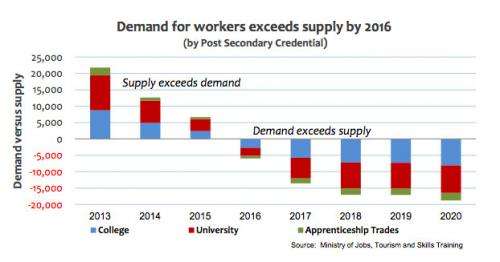British Columbia skills deficit looming in 2016: More jobs than qualified people unless post-secondary capacity expanded

A skills shortage will hit British Columbia in 2016 and continue to grow, unless immediate action is taken to improve access to all types of post-secondary education – university, college and trades.
The BC Labour Market Profile released by the Research Universities' Council of BC and based on the provincial government's BC Labour Market Outlook reveals that in 2016, the number of jobs requiring university, college or trades credentials will exceed the supply of BC graduates – a skills deficit that will grow through to 2020.
In 2020, approximately 18,800 jobs could go unfilled because too few British Columbians have the necessary training – 8,400 requiring a university degree, 8,100 a college credential, and 2,300 trades training.
"This is a wake-up call for all of us. The government data shows that we have to act today," said University of British Columbia President Stephen Toope. "To secure our economy, we need to continue to build on our excellent post-secondary system and deepen our commitment to education, innovation and research."
The issue is urgent for the Lower Mainland, home to two thirds of the one million jobs openings projected for BC from 2010 to 2020.
"It's a myth that tomorrow's jobs don't require university education," said Andrew Petter, president of Simon Fraser University. "To stay competitive, maintain our quality of life and lead in research and innovation, we need more graduates at all post-secondary education levels."
RUCBC has put forward the Opportunity Agenda for BC, which includes three specific measures to fill the growing skills gap and secure our economy:
- A space for every qualified BC student, with 11,000 new student spaces for university, college and trades training over the next four years.
- A guarantee for students in need, with more grants, scholarships and improvements to student loans.
- The launch of the Innovate BC initiative, bringing government, business, and post-secondary institutions together to build on BC's research and innovation potential, advance new opportunities, and help drive economic growth.
More information: Full summary of the BC Labour Market Profile www.rucbc.ca
Provided by University of British Columbia
















